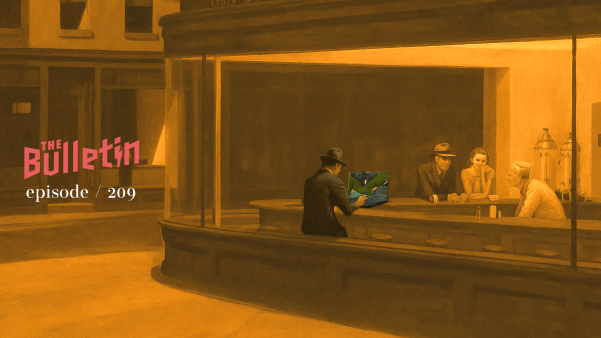Last summer, Slate deputy editor David Plotz, a Harvard-educated Reform Jew, found himself bored out of his mind at a cousin’s bat mitzvah. Rather than feigning interest, he reached into the back of a pew and started to read an English translation of the Torah.
He opened to the soap opera-like saga of Jacob’s sons seeking to avenge the rape of their sister Dinah—and found himself utterly engrossed. The experience became his impetus behind a Slate series called “Blogging the Bible.” Started in September 2006, the blog records Plotz’s progress and comments as he reads through the entire Old Testament, a couple of chapters at a time. The subtitle of the series: “What happens when an ignoramus reads the Good Book?”
Plotz is not a Christian—and he has taken heat for his occasionally irreverent tone—but he allows readers to see the Bible anew through the eyes of someone who set out to read it merely because it’s so compelling. Plotz talked to Christianity Today in late January about his journey through Scripture.
You started “Blogging the Bible” in part because you realized you didn’t know the Bible very well. Do you feel like you have a better handle on it now?
I’m still only half way through—just starting Ezekiel—but I feel like I have a sense of the whole story now: the basic start and finish of God’s covenant, the Exodus and how that all goes south for Israel, and also the nature of God’s laws—why they matter.
Increasingly, I sense why particular portions of the Bible have gotten picked out and why other stories that are just as compelling and lovely seem to get missed. I also have a sense of the rhythm of the book—how to read it, as it were. One reason that people don’t read the Bible is its very unfamiliar language. It jumps around a lot. The prophets, such as Isaiah and Jeremiah, can be especially tough.
So we hang on to stories that are the easiest to retell?
I think so. With certain stories, the message or the moral lesson is very clear. It’s sort of a straight-arrow shot. In other stories, it’s not at all clear. There’s one story that I find absolutely compelling, for example.
I had always heard about the destruction of Sodom and Gomorrah, which were full of iniquity and crime and homosexuality. God punishes them for that. But what I had never heard was in chapter 18, where God stops by Abraham’s tent—sort of just to say “Hi”—and Abraham gets into an argument with God. We have Abraham pleading for God to spare people’s lives. He seems to represent the side of morality, and God seems rather cavalier. Yet it’s this beautiful, beautiful encounter.
What is your religious background?
Both my parents were Jewish, so I grew up in a highly reformed Jewish family. We’re full-on bacon-eating, cheeseburger-eating, lobster-eating Jews. My parents are steeped in Jewish cultural tradition and they strongly identify themselves as Jews, but they are not practicing Jews. My mother is the most well-read person that I know, but she has never read the Bible.
I stopped a lot of Jewish observances after my bar mitzvah. My wife is Israeli and strongly identifies herself as a Jew, but she isn’t really observant either. We have little kids, though, and they go to a nursery in a synagogue, so we’ve been reevaluating things.
Your wife, Hanna Rosin, is a highly regarded religion reporter. Has this experience given you a greater appreciation for her work?
I think the opposite might actually be true. She has managed to cover religion for a long time without a lot of knowledge of Scripture. So it has been inspiring for her to see what I’m doing.
She’s working on a book right now about young evangelicals, aged 19 to early 20s, and she has become friends with many of the people she is profiling. Many of them like the Bible blog. In fact, just before you called, I was e-mailing some of them about a recent post.
Who reads “Blogging the Bible”? What kind of feedback do you get?
When I started, I expected that the response would be heavily negative from observant people—orthodox Jews and evangelical Christians—but it has been just the opposite.
There are two components that make up a small group of negative readers: atheists who say the project is grotesque because I’m taking this book of lies seriously, and biblical literalists—both Jewish and Christian—who think what I’m doing is grotesque because I’m taking the Bible too lightly.
There is another fairly small group of people who are like me. They are secular people who are using the blog as sort of a cheat sheet. They have some kind of religious background, but they don’t know very much, so they’re interested in what I’m uncovering.
But the bulk of my readers is evangelical Christians (with some mainline Christians) and observant Jews who are incredibly enthusiastic about what I’m doing. Christians love it because I am reading the Bible the way they do—alone, as opposed to how Jews read the Bible. Jews always read in groups. You never read alone. I think evangelicals appreciate this personal relationship with the text.
Jews are positive, too, for the most part, even though I’m not reading the way you read if you go to a yeshiva. One of the reasons that Judaism is an intellectually challenging religion is the love of engagement and gamesmanship.
So people are generally positive about your blog?
Most people sense this is a project from the heart. It’s an act of love and a kind of genuine wrestling with the text that they hold so dearly. Even when they disagree or they think I’ve missed something, which is often, they appreciate what I’m trying to do.
Because I’m overt and enthusiastic about my ignorance, people feel, rightly, that I welcome their corrections and answers to questions. Also, I’m reading the book of my own religion, and that makes a difference. I’m probably not going to continue and read the New Testament. It would be much harder to read something that is not from my religion.
As you’ve read passages that Christians consider messianic—Isaiah 53, for example—do you see why they believe what they believe?
I see where Christians are coming from. You read those passages and that’s how the Gospels describe Jesus. My way of describing it, though, is that the people who were writing about Christ wanted to put him in that prophetic tradition. They looked at things retrospectively and fit him into the prophecies.
But certain things can’t be fitted retrospectively.
Well, I want to make it clear that I don’t have a dog in this fight. I really don’t know. I’m talking as someone who doesn’t have a stake in it.
Recently, you referred to God as “the big guy” in a post. Do you use that casual tone because it’s a blog, or is that how you approach your faith?
The danger is that if you sound too casual, then people might think you’re not taking the Bible seriously. But it would be a lie for me to write in portentous language. If I were using high liturgical language or high rabbinical language, that wouldn’t be me.
Also, the Bible is often taught like that—in a formal way with moral lessons attached—but you miss the fact that this is an incredibly bawdy, hilarious, fun—hellacious, even—text. There’s a lot of sarcasm and wordplay and glee and craziness. Sometimes, I think to myself, I can never be as crude as the stuff in Judges. Or, I can never be as sarcastic as Elijah.
So, no, I don’t think I’m being too flip. The Bible is flip all the time.
Because Elijah is sarcastic in his dealings with the prophets of Baal, you can be sarcastic in your treatment of the Bible?
There’s a notion that the Bible is pure and holy and full of family values. Thous, thees, shalls, shants—that’s all there. But what’s also there is human behavior at its most base level. Behaviors that are weird and gleeful and strange.
The writing is like that, too. There’s no stiffness to it. It’s loose and playful. So I feel like the blog should be like that, too. Obviously, I’m making allowances for my own writing, but I think there’s license to do that. You misunderstand the book if you think the only way to write about it is in an awed, distant, timid way. It’s a book that demands appreciation for all its liveliness.
How have other editors at Slate reacted to the blog?
Slate isn’t a religious place. There aren’t many people here in Bible studies. Some of the more observant Jews had concerns; they thought I should quote experts. But they’ve all come around now, and the internal support has been great.
How has reading the Bible changed you?
First, I’m much more aware of how foundational the Bible is for our culture. Many phrases and stories that serve as models for stories today come from the Bible—themes that are the lifeblood of books and movies today. All of a sudden, I see these things, like I’m seeing the world through new glasses.
Second, it has connected me to my historical tradition. The starkest and most delightful moment for me was at the end of Genesis, where Jacob blesses his grandsons Ephraim and Manasseh. I realized that when I bless my son, Jacob, I’m saying the same blessing. Before, I never really knew what I was doing, but I did it because I was supposed to. Now, I realize why, and it’s amazing.
Third, I’ve been sort of an agnostic believer. When pressed, I would always say there is no rational reason to believe. In that regard, the Bible has not changed me; I still feel that way. I hope and pray that God exists, but I’m no closer to absolute certainty.
What has changed is that the book has filled me with moral and profound questions that are demanding and confusing. I end up with this very complicated mental dialogue, asking myself, Why is God doing this? It has grown into a sort of conversation with God. Even though I’m not sure God exists, it’s a kind of spiritual engagement. I’m grappling with what God is doing. For 37 years, I have avoided these questions. I’m not a profound or inward-looking person. Now I’m suddenly faced with these questions. It has put me into a discussion with God.
Alex Runner is a freelance writer living in Milwaukee, Wisconsin.
Copyright © 2007 Christianity Today. Click for reprint information.
Related Elsewhere:
Slate‘s ‘Blogging the Bible: What’s Really in the Good Book‘ is the up-to-date collection of Bible blog entries.
David Plotz writes about his experience and what it means to blog the Bible in ‘Blogging the Bible: What happens when an ignoramus reads the Good Book?‘ An MP3 interview is also available.
NPR’s Weekend Edition Saturday, The San Francisco Chronicle, and Newsday also covered the Bible Blogger.







